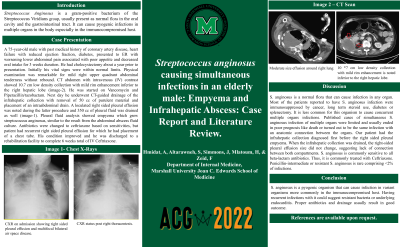Back


Poster Session D - Tuesday Morning
Category: Liver
D0609 - Streptococcus Anginosus Causing Simultaneous Infections in an Elderly Male: Empyema and Infrahepatic Abscess: Case Report and Literature Review
Tuesday, October 25, 2022
10:00 AM – 12:00 PM ET
Location: Crown Ballroom

Has Audio

Ahmed Hmidat, MD
Marshall University Joan C. Edwards School of Medicine
Huntington, WV
Presenting Author(s)
Ahmed Hmidat, MD, Saba Altarawneh, MD, Joseph Simmons, MD, Hamza Mlatoum, MD, Fuad Zeid, MD
Marshall University Joan C. Edwards School of Medicine, Huntington, WV
Introduction: Streptococcus Anginosus is a gram-positive bacterium of the Streptococcus Viridians group. Usually presents as normal flora in the oral cavity and the gastrointestinal tract, S. Anginosus can cause pyogenic infections in multiple organs in the body especially in the immunocompromised host. We present a case of S. Anginosus multiple sites infection in an immunocompetent host that was successfully treated.
Case Description/Methods: A 75-year-old male with history of diabetes, coronary artery disease, and heart failure with reduced ejection fraction presented to ER with worsening lower abdominal pain associated with poor appetite and decreased oral intake over 3 weeks. He had cholecystectomy about a year prior to presentation. He was clinically stable on examination with mild right upper quadrant tenderness without rebound. CT abdomen with intravenous contrast showed 10*7 cm low-density fluid collection with mild rim enhancement inferior to the right hepatic lobe. He underwent CT-guided drainage of the infrahepatic collection with removal of 50 cc of purulent material and placement of an intraabdominal drain. Also, a loculated right pleural effusion was noted on CT, and 350 cc of purulent pleural fluid was drained, with analysis compatible with empyema. Both fluid cultures grew S. anginosus. Empirical antibiotics were changed to ceftriaxone, but patient had recurrence of right pleural effusion and required repeat thoracentesis. He gradually improved and completed 6 weeks of Ceftriaxone.
Discussion: S. anginosus is a normal flora that can cause infection in any organ. Most of the patients reported to have S. anginosus infection were immunosuppressed by cancer, long term steroid use, diabetes or splenectomy. It is less common for this organism to cause concurrent multiple organs infections. Published cases of simultaneous S. anginosus infection of multiple organs were limited and usually ended in poor prognosis like death or turned out to be the same infection with an anatomic connection between the organs. Our patient had the infrahepatic collection diagnosed first before the right sided pleural effusion enlarged. When the infrahepatic collection was drained, the pleural effusion size did not go down, suggesting lack of connection between both collections. S. anginosus is commonly sensitive to antibiotics. Thus, it is commonly treated with Ceftriaxone. Penicillin-intermediate or resistant S. anginosus is rare comprising < 2% of infections and does not usually lead to treatment failure.
Disclosures:
Ahmed Hmidat, MD, Saba Altarawneh, MD, Joseph Simmons, MD, Hamza Mlatoum, MD, Fuad Zeid, MD. D0609 - Streptococcus Anginosus Causing Simultaneous Infections in an Elderly Male: Empyema and Infrahepatic Abscess: Case Report and Literature Review, ACG 2022 Annual Scientific Meeting Abstracts. Charlotte, NC: American College of Gastroenterology.
Marshall University Joan C. Edwards School of Medicine, Huntington, WV
Introduction: Streptococcus Anginosus is a gram-positive bacterium of the Streptococcus Viridians group. Usually presents as normal flora in the oral cavity and the gastrointestinal tract, S. Anginosus can cause pyogenic infections in multiple organs in the body especially in the immunocompromised host. We present a case of S. Anginosus multiple sites infection in an immunocompetent host that was successfully treated.
Case Description/Methods: A 75-year-old male with history of diabetes, coronary artery disease, and heart failure with reduced ejection fraction presented to ER with worsening lower abdominal pain associated with poor appetite and decreased oral intake over 3 weeks. He had cholecystectomy about a year prior to presentation. He was clinically stable on examination with mild right upper quadrant tenderness without rebound. CT abdomen with intravenous contrast showed 10*7 cm low-density fluid collection with mild rim enhancement inferior to the right hepatic lobe. He underwent CT-guided drainage of the infrahepatic collection with removal of 50 cc of purulent material and placement of an intraabdominal drain. Also, a loculated right pleural effusion was noted on CT, and 350 cc of purulent pleural fluid was drained, with analysis compatible with empyema. Both fluid cultures grew S. anginosus. Empirical antibiotics were changed to ceftriaxone, but patient had recurrence of right pleural effusion and required repeat thoracentesis. He gradually improved and completed 6 weeks of Ceftriaxone.
Discussion: S. anginosus is a normal flora that can cause infection in any organ. Most of the patients reported to have S. anginosus infection were immunosuppressed by cancer, long term steroid use, diabetes or splenectomy. It is less common for this organism to cause concurrent multiple organs infections. Published cases of simultaneous S. anginosus infection of multiple organs were limited and usually ended in poor prognosis like death or turned out to be the same infection with an anatomic connection between the organs. Our patient had the infrahepatic collection diagnosed first before the right sided pleural effusion enlarged. When the infrahepatic collection was drained, the pleural effusion size did not go down, suggesting lack of connection between both collections. S. anginosus is commonly sensitive to antibiotics. Thus, it is commonly treated with Ceftriaxone. Penicillin-intermediate or resistant S. anginosus is rare comprising < 2% of infections and does not usually lead to treatment failure.
Disclosures:
Ahmed Hmidat indicated no relevant financial relationships.
Saba Altarawneh indicated no relevant financial relationships.
Joseph Simmons indicated no relevant financial relationships.
Hamza Mlatoum indicated no relevant financial relationships.
Fuad Zeid indicated no relevant financial relationships.
Ahmed Hmidat, MD, Saba Altarawneh, MD, Joseph Simmons, MD, Hamza Mlatoum, MD, Fuad Zeid, MD. D0609 - Streptococcus Anginosus Causing Simultaneous Infections in an Elderly Male: Empyema and Infrahepatic Abscess: Case Report and Literature Review, ACG 2022 Annual Scientific Meeting Abstracts. Charlotte, NC: American College of Gastroenterology.
